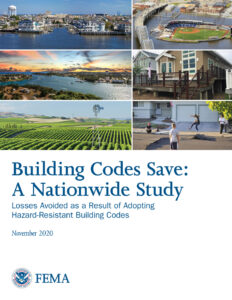
New FEMA study projects implementing I-Codes could save $600 billion by 2060
 The Federal Emergency Management Agency (FEMA) released its landmark Building Codes Save: A National Study featuring an in-depth look at the quantified benefits — avoided losses to buildings and building contents — from adopting modern building codes and standards. As the frequency and severity of natural hazards continue to increase year-over-year, this study reaffirms that building codes continue to be the best first line of defense.
The Federal Emergency Management Agency (FEMA) released its landmark Building Codes Save: A National Study featuring an in-depth look at the quantified benefits — avoided losses to buildings and building contents — from adopting modern building codes and standards. As the frequency and severity of natural hazards continue to increase year-over-year, this study reaffirms that building codes continue to be the best first line of defense.
“With incredible analytic detail, this study reaffirms what so many studies before have concluded — adopting and implementing the I-Codes is one of the most effective ways to safeguard our communities against disasters,” said Code Council Chief Executive Officer Dominic Sims, CBO. “But further strides must be made in states and localities where the report identifies there are no codes adopted or where codes have not been updated this century. We thank FEMA for highlighting the value of and need for coordinated action at all levels of government that is critical to ensuring our homes and businesses are best positioned to weather the increasing hazard risks posed by our changing climate.”
The study affirmed the recent finding by the National Institute of Building Sciences that adopting modern codes provides $11 in mitigation savings for every $1 invested. Alarmingly, the FEMA study found that currently, 65 percent of counties, cities and towns across the United States have not adopted modern building codes, only 50 percent of cumulative post-2000 construction adhered to the International Codes (I-Codes), and 30 percent of new construction is occurring in communities with no codes at all or codes that are more than 20 years outdated.
“This study is excellent news for consumers as it delivers powerful economic evidence that modern building codes are the essential public policy tool to help communities survive and recover from disasters,” said Federal Alliance for Safe Homes President and Chief Executive Officer Leslie Chapman-Henderson. “The findings validate yet again that safer and stronger buildings preserve our quality of life today and strengthen our ability to confront an accelerating number of deadly, billion-dollar disasters tomorrow. We urge all leaders to recognize and use these profound insights to champion the cause for codes, and we thank FEMA for their leadership in bringing this critical information forward.”
“We are not powerless in the face of severe weather,” explained Dr. Anne Cope, chief engineer for the Insurance Institute for Business & Home Safety (IBHS). “The latest building science, including research conducted at the IBHS Research Center, points us to actionable and affordable ways to strengthen our homes and businesses to reduce avoidable losses from natural catastrophes. A critical step toward ending the cycle of repeated losses, particularly in coastal areas, is the adoption and enforcement of modern building codes.”
Based on a database of more than 18 million actual buildings constructed since the inception of the I-Codes in 2000, the frequency of hazard events across the country, and the contents and edition of the International Residential Code (IRC) and International Building Code (IBC) in effect in each locality where post-2000 construction took place, the study found:
- The IRC and IBC provided more than $27 billion in cumulative mitigation benefits against flood, hurricane wind and earthquake hazards from 2000 to 2016. These benefits could have been doubled if all post-2000 construction adhered to the I-Codes.
- If construction continues at the pace the study observed and if the proportion of that construction adhering to the I-Codes is consistent with the trend the study identifies, the I-Codes could help communities avoid $132 billion to $171 billion in cumulative losses through 2040.
- If all new buildings across the U.S. were built to modern editions of the I-Codes, the country would save more than $600 billion by 2060.
The cost of not adopting building codes is too high. As FEMA’s materials make clear: “Adopting building codes is the single most effective thing we can do! One change in building codes can save lives and protect property for generations to come.” Proper implementation of adopted codes is also critical, as the means through which codes’ theoretical benefits are delivered in the field.
More resources:
- Information on how building codes help communities mitigate hazard risks
- Summary of FEMA’s report
- Full FEMA report: “Building Codes Save: A National Study”
For more information about the building codes adopted in your community, click here.







